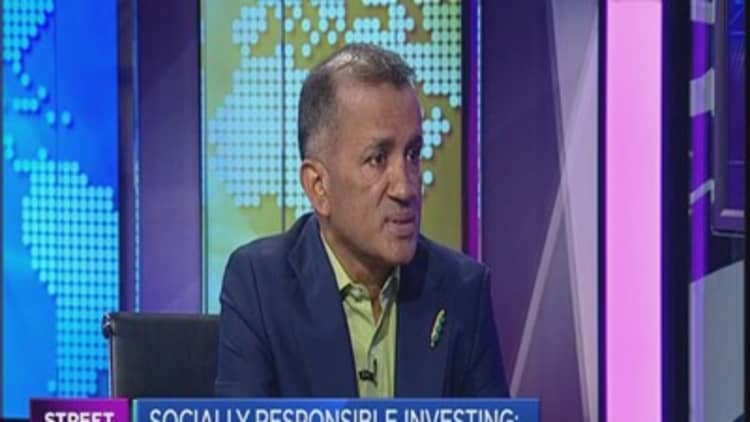Investors are hungry for socially responsible mutual funds, and lately, it's the ones that avoid fossil-fuel stocks that are getting the most attention. It's a trend that has gained momentum over the last few years. Why?
One reason is an underappreciated — if not at times outright dismissed — global sleeper risk that recent estimates say has the potential to wipe out $100 trillion in fossil-fuel company value.
More investors are finally waking up to it, and two recent news developments may force more investors to question their fossil-fuel investment holdings.
On Friday, President Obama rejected the Keystone XL Pipeline, a major item on the wish list of the oil and gas industry, and a presidential decision considered a "litmus test" for climate-change activists.
Earlier in the week, the New York State Attorney General to deceive the public about climate science for decades, masking from investors the risks to its business. More oil and gas companies are expected to become subjects of the unprecedented investigation, , a case that is being compared to the battle against tobacco companies who lied for decades about health risks from smoking.
Are mutual funds — and their investors — that made the move early to exclude fossil-fuel investments way ahead of the curve in displaying their climate change–linked investment savvy?
Traditionally, socially responsible funds avoided tobacco, weapons manufacturers, alcohol and gambling stocks. The fossil fuel–free investing trend has been most prominent on the institutional side of the fund business. Very large investors, including university endowments like Stanford's and private foundations, have divested from longtime holdings in fossil-fuel stocks — in Stanford's case, coal stocks specifically. Last year, a Rockefeller family foundation created by the sons of John D. Rockefeller — who made his vast fortune by founding Standard Oil — announced that it was divesting from fossil-fuel stocks.
The Portfolio 21 Global Equity Fund (PORTX), which was launched in the late 1990s, has never held fossil-fuel stocks. The fund doesn't invest in any natural resource extraction companies, such as gold or silver mining, either.
Tony Tursich, co-manager of the Portfolio 21 fund, said excluding natural resource stocks was a risk-management decision. One of the concerns is that fossil-fuel companies won't be able to tap reserve assets across the globe in the future due to the governments of the world waking up to a worsening environment and taking strict regulatory action. The idea that oil and gas companies will have to write off tons of natural resources underground, and possibly go bankrupt themselves, is referred to as the "stranded assets" theory.
"There's more demand for fossil-free funds from investors," said David Kathman, a mutual fund analyst at Morningstar. "People want to have that option. With oil prices so up and down, there's more volatility anyway."
Tools are increasingly popping up for vetting mutual funds like these and helping investors make their funds underlying stock holdings transparent. One is FossilFreeFunds.org, where you can find out if your fund owns one of the 200 largest companies with oil, gas and coal reserves.
This risk is also worrying Wall Street.
This past summer Citigroup issued a report predicting that $100 trillion of fossil-fuel assets are at risk of never being used.
That is a calculation based on the stated target for the December climate conference in Paris to limit global warming to 2 degrees Celsius. To meet that goal, one half of global gas and 80 percent of global coal reserves need to stay in the ground, the Citigroup report stated.
"There are lots of regulatory risks that fossil-fuel stocks have," said Julie Gorte, senior vice president for sustainable investing at PAX World Management. "There's also litigation risks," she added. The Pax World Growth Fund (PXGAX) doesn't own any fossil-fuel stocks.
Citigroup is optimistic, though, that big emitters "seem to be coming to the table with positively aligned intentions."

Some financial advisors are helping investors find fossil fuel–free funds based on their own concerns. Stephen Vogel, a Nashville, Tennessee-based financial advisor who worries that oil and gas companies won't be able to monetize their large reserves due to their effects on climate change, has been recommending to investors Calvert Group's U.S. Large Cap Core Responsible Index Fund (CISYX), which doesn't currently own any fossil-fuel stocks.
The "stranded assets" theory is not the only emerging risk changing the approach to socially responsible investing. Currently, the Portfolio 21 Global Equity fund is avoiding sugary drink companies like Coca-Cola and PepsiCo. "There's the risk of class-action lawsuits for sugary drinks," Tursich said. "And then there are the water risks."
Despite their widely different visions, social responsible funds have performed well, according to many studies. The MSCI KLD 400 Social Index, a widely used benchmark that includes environmental stocks, has outperformed the S&P 500 annually since its launch in 1990.
Morgan Stanley's "Sustainable Reality" report analyzed the performance of more than 10,000 mutual funds and found that "sustainable equity" funds met or exceeded median returns of traditional equity funds during 64 percent of the time periods examined. Over the longest time period analyzed (seven-year trailing period between 2008-2014), Morgan Stanley found that sustainable equity funds met or exceeded median returns for five out of the six different equity classes examined.
There are now roughly 150 socially responsible mutual funds, according to Morningstar. One out of every six dollars invested in professionally managed funds in the U.S. is now invested in socially responsible portfolios, according to the Forum for Sustainable and Responsible Investment. Many millennial investors and women investors, who now control $11.2 trillion in investible assets, are choosing socially responsible investments.
The trend is expected to keep growing over the next five years, according to a Morgan Stanley Institute for Sustainable Investing survey, and as the number of funds increases, the approach taken by various funds to fossil fuel stocks, and the funds' returns, will vary.
Common sense and rational decision-making, not fear of the apocalypse, should ultimately guide investors interested in this approach. "Look at a socially responsible fund's track record relative to its peer group," Morningstar's Kathman said. "And look at its portfolio. You want to own something that makes sense to you."
Select carbon-free socially responsible funds
Parnassus Endeavor Fund (PARWX)
Expense ratio: 0.95 percent
5-year return:15.23 percent
$1.4 billion in assets
PAX World Growth (PXGAX)
Expense ratio: 1.26 percent
5-year return: 12.28 percent
$191.3 million in assets
Gabelli SRI (SRIGX)
Expense ratio: 1.64 percent
5-year return: 7.66 percent
$73 million in assets
Portfolio 21 Global Equity (PORTX)
Expense ratio: 1.4 percent
5-year return: 6.27 percent
$433 million in assets
Calvert U.S. Large Cap Core Responsible Index Fund (CISYX)
Expense ratio: 0.60 percent
5-year return: 14.34 percent
$636.5 million in assets
(Source: Morningstar)
Story updated to include NY Attorney General Exxon Mobil case, President Obama Keystone XL pipeline rejection.
—By Constance Gustke, special to CNBC.com






